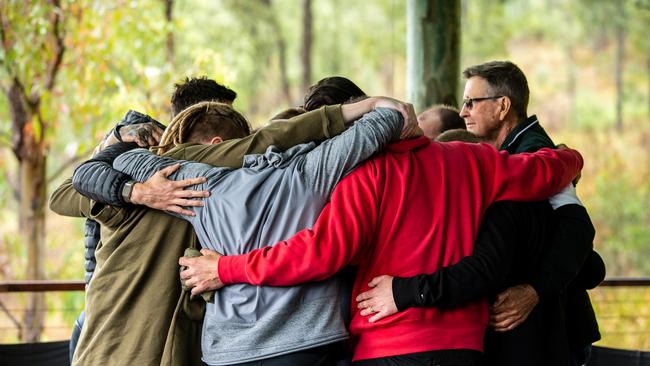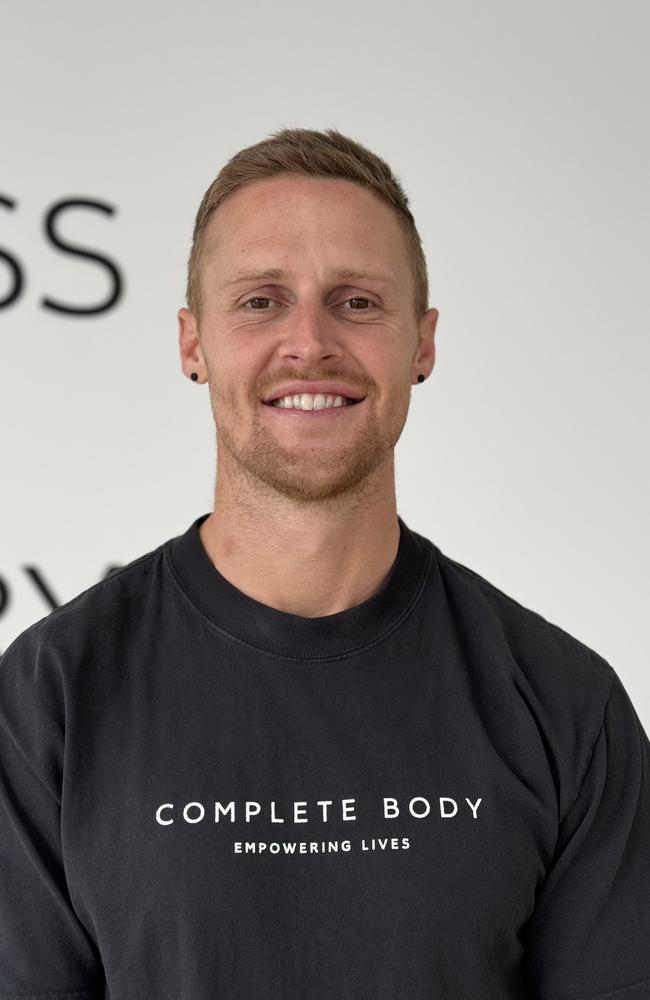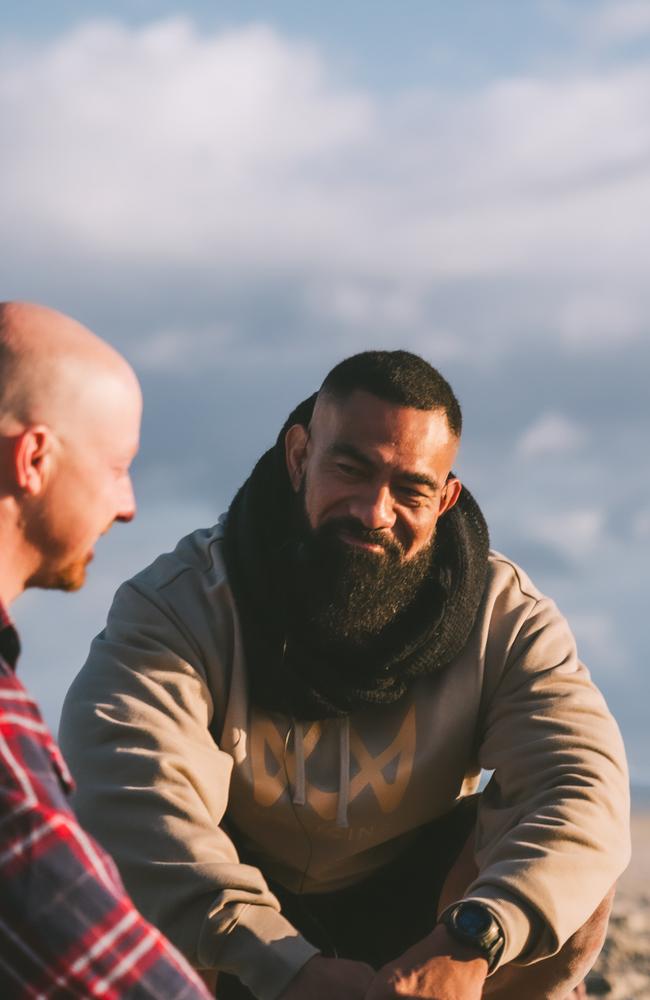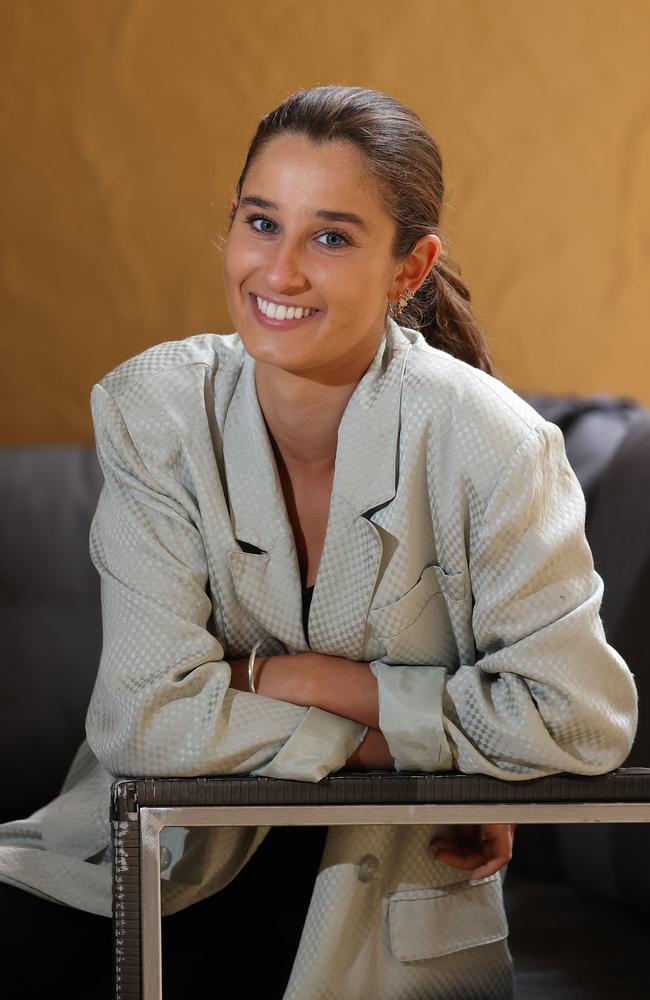Ice baths, fire circles: The $1500 male-only retreats tackling toxic masculinity
Many men are struggling. And some are turning to male-only retreats.

QWeekend
Don't miss out on the headlines from QWeekend. Followed categories will be added to My News.
Standing before a sea of unfamiliar faces, heart pounding, Jake takes a deep breath. The subtle scent of sage, lingering from an earlier cleansing, fills the air.
It’s the first night of a men-only retreat. Ten pairs of eyes, all strangers, look up at him from their yoga mats.
When Jake, 25, signed up for the weekend retreat two hours from Brisbane, he was feeling lost. He remembers this as he begins to share his story with the group.
“Hi everyone. I’m Jake. I’ve just gone through a really terrible break up. It has really defeated me and left me realising there is a lot more to life. So, I’m here to learn the tools to start to understand what I want my life to look like.”
He exhales a sigh of relief.
This is how the Awaken retreats start – with a vulnerability circle, where men share their deepest, darkest secrets. Jake, and the other participants, are part of a growing movement, to redefine masculinity.
“It was extremely difficult to be honest. It’s certainly confronting,” Jake recalls.
“But it also feels so good to express yourself.”
Men-only retreats are a new trend across Australia, often marketed with slogans such as “You have more potential” and “Your future is still unwritten”. Retreat organisers claim they’re offering a space where men can express their emotions without judgment.
Many of these retreats are held outdoors. The fresh air, nature and feeling earth under the soles of their feet are all believed to ground the men and encourage deeper introspection. And men can learn to be, well, better men.
Ben Loxley, from Queensland, founded Awaken a couple of years ago, after more than a decade working as a personal trainer.
The 35 year old’s journey to this new calling began when he left a psychology degree and embraced kinesiology and breathwork. After experiencing the benefits of both, Loxley integrated them into his business.

Men started seeking his guidance with these techniques and, in turn, opening up to Loxley. This revealed a significant need for a supportive environment for men to discuss their issues candidly. In the past year he’s hosted three sold-out retreats, with participants paying upwards of $1500 each to attend. The demographic is wide, from 20-50 years of age, from all backgrounds.
“Men are keeping everything close to their chest because they feel that to speak to someone is a weakness. And a lot of men don’t even have anyone they can speak with even if they wanted to,” Loxley explains.
Loxley uses a blend of physical and mental workshops, such as ice baths. Participants are encouraged to then gather around a fire circle, to warm up and get to know each other before taking another plunge.
The men are urged to shed any fears of vulnerability as they face the mental resilience challenge of plunging into near-freezing water. The idea of the fire and ice activity, Loxley tells me, is to test their mental strength, helping the men believe they can overcome any challenge.
The evidence on ice baths is mixed. But for many, cold plunging is simply a mental exercise to test the limits of their endurance.
Historically, fire circles have been used in various cultures for storytelling, healing and community bonding. They serve a similar purpose at the retreats.

Lino Hola from Mens Medicine in NSW runs his retreats in the Hunter Valley and Byron.
The crisp air and the outdoor environment are an antidote to the hustle and bustle of the
9-to-5, creating a safe space as the men undergo activities such as breathwork, primal screaming, meditation, journaling and movement.
“We get men exercising, we go on walks, and once we’ve been able to burn off enough energy, then we can have a more pleasant conversation. The intention for us at our retreat is to push the physical body to break, then we can dive deeper into the inner work,” Hola explains.
But why do men need this inner work? What are they struggling with today? Contrary to patriarchal stereotypes, men do get upset. They stress and worry about work, finances, substance or pornography addictions and loneliness.
Hola, 40, says many of his clients are grappling with their relationships or trauma from their upbringing, but feel they can’t express their emotions.
“When it comes to men, there can be a lot of walls, a lot of barriers that we have to overcome,” Hola says.
“Many men haven’t been taught vulnerability, so they’re just making it up as they go along in life. They’re just doing the best they can with the tools they have.”
Chanel Contos, founder of Teach Us Consent, which is a campaign working towards eradicating sexual violence while promoting gender equality, agrees with this sentiment.
“Strict norms and expectations are often internalised by men which can result in struggles for them,” the 26 year old says.

The retreats also address toxic masculinity, which both Hola and Loxley are adamant has no place at their events.
“We touch a lot on positive feminine and masculine energy versus the toxic side. Toxic masculine energy is aggression, and imposing that anger on others, control, and really stepping into an arrogant ego,” Loxley says.
The problem is compounded by the influence of figures like social media personality Andrew Tate, who’s been dubbed the “king of toxic masculinity” and is a self-described misogynist. Tate is being detained in Romania on charges of human trafficking and rape.
“Our world, increasingly so with social media, celebrates men who are seen with flashy cars, big muscles and lots of attractive women. This does not necessarily correlate to healthy role models,” Contos says.
Hola agrees, “The silver lining around the Andrew Tates of the world is that it’s shown us what we don’t want. Right? That is definitely not what we want.”
University of Melbourne political scientist Associate Professor Lauren Rosewarne specialises in gender studies and questions the need for male role models altogether.
“Why do we actually have this idea of a role model in order to guide you on how to be a human? We’re better off compiling qualities that we see in people who we admire, and look at individual characteristics of what we want in a good person. And just treat others decently.”
The men I’ve spoken to for this story agree Australia is in a male violence crisis. Men are hurting themselves and they are hurting others.
Contos says, “Many men turn to vices such as pornography, gambling, alcohol and other drugs when they are struggling within themselves. Unhealthy engagement with these habits can then have a devastating effect on those around them, particularly women and children.”

Australia has a disproportionately high rate of male violence towards women, with one in four women experiencing physical or sexual violence from an intimate partner.
As detailed in an April 2024 Australian Institute of Health and Welfare report, 27 per cent of women are victims of domestic family violence, 23 per cent experience emotional abuse from a partner, and 16 per cent report financial abuse. This year, 46 women have been killed by male violence, including the five at Bondi Junction in April.
And according to Suicide Prevention Australia, more than 3200 lives are lost to suicide annually, with 75.9 per cent being men. The largest demographic is men aged 45-49.
Less than half of the men who die by suicide have been diagnosed with a mental health disorder, with many choosing not to engage with the available mental health services.
Both Loxley and Hola acknowledge they don’t have the answers to this crisis, but emphasise that even small steps like creating a supportive environment for men through a retreat, can help.
Rosewarne offers a markedly different perspective, suggesting there is little evidence that the techniques used at retreats have a positive impact on men and society. Instead, she draws parallels to cults.
She does note that “men getting together and talking about their feelings can be positive”, as long as it doesn’t border on discussions of “my life is awful because of women”.
Jake, reflecting on his experience, says the retreat transformed his life. He left his trade as an electrician to become a personal trainer. He says he also focuses on investing time in his relationships.
“I think the biggest thing for guys is to find those mateships, the blokes who will actually listen and support you because you’re always going to have ups and downs. You need the right people around you.”




